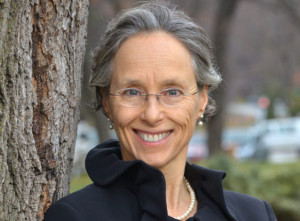Five-part series delved deep into climate change

Environmental Commissioner Dianne Saxe
Dr. Dianne Saxe, Ontario’s environment commissioner, set the stage with a wide-ranging and frank overview, ‘Climate Changes Everything’
Third Age Barrie, A Life Long Learning Association, continued to provide stimulating and timely lectures with its fall series ‘Climate Change: Understanding Globally, Adapting Locally.’ The five-part series which ran from Sept. 25 – Oct. 23 at Grace United Church in Barrie sold out in a record-breaking 13 minutes when tickets went on sale in early September.
Dr. Dianne Saxe, Ontario’s Environment Commissioner, set the stage for us with her wide-ranging and frank overview, ‘Climate Changes Everything.’ Dr. Saxe summarized what we now know about climate change: that it is real, caused largely by human use of fossil fuels which create greenhouse gasses, and is at least partially responsible for extreme weather events in Ontario and around the world. In addition, climate change is providing challenges for human health, and is responsible for the disappearance of polar ice and permafrost as well as radical alteration of habitat for flora and fauna.
She provided evidence that until recently Ontario had been making progress by eliminating coal-fired energy generation, promoting low-carbon initiatives, and supporting the cap and trade program. Since most of these measures have been reversed by the current government, Ontario is running out of time to meet the challenge of climate change. Governments must get serious about curbing climate change by reducing emissions (mitigation) and adjusting to the impacts that will continue to multiply (adaptation).
A panel on Government Responses told us more about what our governments–municipal, provincial and federal– may or may not be doing to address climate change. Mayor Jeff Lehman outlined steps that the City of Barrie is taking to prepare city infrastructure for the impact of wilder weather; Ontario Green Party Deputy Leader Bonnie North warned that time is running out for the provincial government to put together a serious plan to reduce emissions and help Canada move effectively on its Paris Agreement goals; consultants Beate Bowron and Gary Davidson described projects they have facilitated in Nunavut and in the Philippines to help communities adapt to climate change. The main take-away: even if we stopped all greenhouse gas emissions today, we would still be adapting to climate change for the next 100 years!
On Oct. 9, Barrie’s own Dave Phillips (Chief Meteorologist, Environment Canada) presented a vivid and engaging summary of how our weather is changing faster than we can adapt to it. “100 year storms” are happening much more frequently exacerbating the impact of climate change is the way that humans are changing the surface of the earth: cutting down forests, straightening and damming rivers, draining wetlands, paving grasslands. “Warmer, wetter, wilder” is becoming the norm. Dave noted that the cost of doing something now to adapt is much less than the likely cost of doing nothing now and paying later to pick up the pieces.
On Oct. 16, Dr. Charles Gardner, Medical Officer of Health and Morgan Levison, Public Health Promoter from the Simcoe Muskoka District Health Unit outlined how climate change will have a lasting negative impact on our health. We are vulnerable to the impacts of climate change such as extreme temperatures and weather, air quality, food and water safety, vector borne diseases such as West Nile and Lyme disease, UV radiation. Those most vulnerableinclude low income people, seniors, children, Indigenous populations. One bright light: if we were to take serious steps to protect our communities from the worst effects of climate change, we would also be improving public health. Developing more compact urban development with better connections and mixed-use spaces, better transit, recreational facilities, local food production, more trees, green infrastructure and better designed buildings have the dual purpose of improving health benefits while taking action on climate change.
The final session Oct. 23 on Local Initiatives three local activists shared their passion for working on aspects of climate change. Dr Brad Dibble, a Barrie cardiologist who is a trained facilitator in Al Gore’s Climate Reality program, described his personal journey of growing understanding and advocacy to stimulate action on climate change. Margaret Prophet, Executive Director of the Simcoe County Greenbelt Coalition, spoke about how an expanded Simcoe County Greenbelt would preserve wetlands, forests, lakes and rivers and farmland that are natural mitigators of climate change. And Dave Collacutt described the Drawdown Program, a comprehensive science-based plan to reverse global warming. He highlighted how many initiatives that are currently underway can have a positive impact. Examples are as diverse as reducing food waste, increasing telecommuting and educating girls.
TAB participants were encouraged to apply their increased understanding of climate change in their own lives—by lighting an LED candle to help brighten the surrounding darkness!
More information on the series is available on the website: www.thirdagebarrie.ca.









Leave a Reply